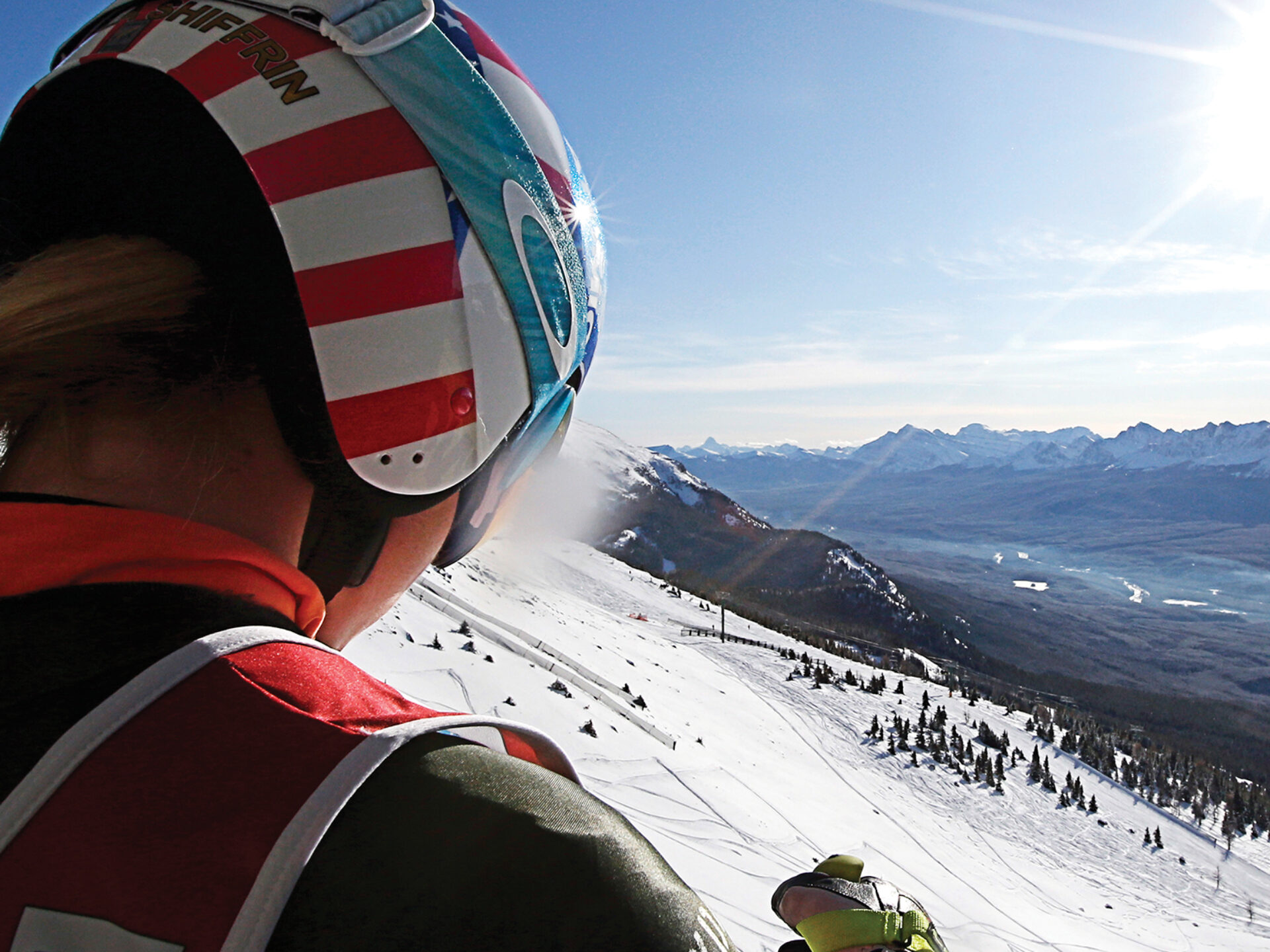Perspectives

August 9, 2021
November 15, 2021

This article was originally published in Populous Magazine, our biannual publication featuring news and trends from the worlds of sport, entertainment, and major public events. Find out more, and sign up to receive a free copy, here.
Mikaela Shiffrin already has two Olympic and six World Championship gold medals for alpine skiing. In advance of the Beijing 2022 Olympics, Gabriella Le Breton, author of The Ultimate Ski Book, finds out what drives this exceptional athlete to throw herself downhill so frighteningly fast.
“My biggest goal is to be the best skier in the world,” states Mikaela Shiffrin. It’s a bold aim, and the 26-year-old American’s determination to achieve it has incurred more than a few snide comments from fellow competitors. However, it’s hard to argue with unstinting dedication and motivation when it brings with it such success.
To list but a few achievements, Shiffrin is the youngest athlete ever to win an Olympic slalom gold medal (Sochi 2014, aged 18); the most decorated American athlete in FIS Alpine World Ski Championships history; the youngest skier to reach 50 World Cup victories; the first athlete in World Cup history to win in all six alpine disciplines; and the first competitive skier to walk away with over US$1 million in prize money for a single season. Note that none of these accolades make any reference to Shiffrin’s gender: she doesn’t just outshine her female competitors – she’s outperforming the men too.
But surely this success can’t stem from hard work alone? Even if Paul Kristofic, head women’s alpine coach at governing body U.S. Ski & Snowboard, describes Shiffrin’s work ethic as “unprecedented in our sport.” Former US champion skier Bode Miller describes her as a “once-in-a-century-type of athlete”, and praises her “unparalleled technical prowess and risk management”. British Olympic skier Chemmy Alcott points out her ability to “do everything unbelievably well, all the time.”
Perhaps the real secret to Shiffrin’s success, however, lies in her love of the sport. “It’s like nothing else on Earth,” she says. “It feels like flying and I’m totally addicted to it.”
Skiing for the joy of it is something her father, Jeff, always encouraged her to treasure and prioritise over winning races. During Shiffrin’s upbringing in Colorado, New Hampshire and Vermont, both her parents played integral roles in her rise to superstardom. Tragically, in February 2020, Jeff died of a head injury, shortly after the death of Shiffrin’s grandmother. Shiffrin and her close-knit family were devastated, and the skier took a six-week break from the sport to grieve with her mother, Eileen, and brother Taylor. “My life was flipped upside down and inside out,” she later said.
Shiffrin’s relationship with her mother, who already coached her daughter, grew even closer during this time. As Taylor has said of the two: “They’re one half of one soul, one heart.” Shiffrin herself once told her mother: “You are my stable factor. My edge. When people ask me what my secret is, it’s you Mom.”
Having taken time out to grieve, Shiffrin’s planned return to the circuit in March 2020 was derailed by the pandemic, which also prevented her from accessing any summer training camps. This, compounded by a pre-season back injury, translated into a potentially career-busting 300-day break between competitive races.
Remarkably, the months away from skiing, and time out for reflection, seemed to galvanise her. She kicked off her 2020/21 World Cup season with a silver medal in the slalom at the Finnish resort, Levi, and went on to take gold and bronze medals in the combined and super-G at the Italian resort, Cortina d’Ampezzo, making her USA’s most successful World Championship skier of all time – even more successful than Lindsey Vonn – just over a year after her father’s death. It was a significant and deeply emotional milestone, which she summed up thus: “I feel like this past year lasted 20 years.”
That marathon year also appears to have precipitated a degree of personal change in Shiffrin, who is growing in her confidence to speak out about personal and political issues. She has opened up about her childhood shyness and experiences of severe performance anxiety. Following the 2014 Sochi Olympics, she described how art and music have helped her mental health, particularly while coping with the deaths of her father and grandmother.
Shiffrin strives to offer young female competitive skiers a support network she feels she never benefited from. She also actively promotes equality of pay in sport for both genders. While ski racing pays men and women the same, many other sports do not.
"Shiffrin strives to offer young female competitive skiers a support network she feels she never benefited from..."
Embarking on her third Winter Olympics, in February 2022, Shiffrin is favourite to win medals in the giant slalom, slalom and combined events, and is likely to dominate the forthcoming World Cup circuit, adding to her 68 World Cup wins to close the gap on record-holders Ingemar Stenmark (86 wins) and Lindsey Vonn (82 wins). However, as she says: “Records are made to be broken. That’s part of the reason I don’t necessarily care about breaking records. Hopefully, somebody is going to come up and break at least some of mine. Otherwise, I didn’t do a good job of inspiring anyone.”
Populous has been involved in the design of venues at every Winter Olympics since Nagano 1998.
Lorem ipsum dolor sit amet consectetur, adipisicing elit. Non facere corporis et expedita sit nam amet aut necessitatibus at dolore enim quis impedit eius libero, harum tempore laboriosam dolor cumque.
Lorem, ipsum dolor sit amet consectetur adipisicing elit. Illo temporibus vero veritatis eveniet, placeat dolorem sunt at provident tenetur omnis, dicta exercitationem. Expedita quod aspernatur molestias eum? Totam, incidunt quos.